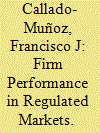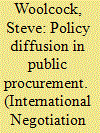| Srl | Item |
| 1 |
ID:
140724


|
|
|
|
|
| Summary/Abstract |
In this paper I examine the extent to which preferential trade agreements (PTAs) limit the Australian government's ability to use public procurement for local industry development ends. I do so not only by examining Australia's PTA obligations, but also by examining how other governments with similar obligations—such as Korea—are using public purchasing policies to promote local industrial advancement. I find that the PTA obligations of the Australian and Korean governments leave them both significant scope to use public purchasing strategically. Interestingly, however, Australian policymakers have been standing still in the room that remains, and even abandoning PTA-compliant procurement-linked development policies. South Korean policymakers on the other hand have been capitalising on every inch of space left open to them—and even experimenting with new forms of strategic public purchasing that nonetheless comply with their international obligations. I conclude by offering some suggestions as to how we might explain these countries’ radically different approaches to procurement policy, despite their very similar international obligations.
|
|
|
|
|
|
|
|
|
|
|
|
|
|
|
|
| 2 |
ID:
191077


|
|
|
|
|
| Summary/Abstract |
Kazakhstan, seen as an example of political stability in Central Asia, recently descended into political turmoil. While the causes of the violence and unrest are the subject of ongoing analysis, their origins can be linked to systemic inequalities in a country rich in natural resources. Inter alia, Kazakhstan has failed to tackle insidious problems of corruption, particularly in public procurement contracts. Public procurement constitutes a significant amount of government spending in developing countries which makes it a high-risk area for corruption. Using primary data collected from small and medium-size enterprises organisations in Kazakhstan, this research finds that public officials and suppliers are complicit in corrupt practices. Intervention strategies, such as monitoring and control, have failed to tackle this problem. While the causes of recent political instability in Kazakhstan are multiple, corruption remains an underlying and persistent problem which will add to the fermenting discontent among the citizens of Kazakhstan.
|
|
|
|
|
|
|
|
|
|
|
|
|
|
|
|
| 3 |
ID:
184055


|
|
|
|
|
| Summary/Abstract |
This paper studies the effects of legal reforms associated with defence and public procurement on firm performance. With this aim, a theoretical framework for the reaction of defence firms to regulatory changes is developed. Its predictions have been empirically assessed using the last reforms implemented in Spain. Our results suggest that these new regulations have allowed the main defence contractors to outperform the other defence contractors in terms of productivity, having no effect on profitability. These findings are in line with theoretical priors. Therefore, it can be claimed that governmental interventions have had an effect on firm performance. We also provide evidence that, while the procurement procedures and the contract law put into place in 2011 have principally affected the productivity of large firms, the centralization process established in 2014 has exerted a higher influence on SMEs.
|
|
|
|
|
|
|
|
|
|
|
|
|
|
|
|
| 4 |
ID:
120722


|
|
|
|
|
| Publication |
2013.
|
| Summary/Abstract |
Abstract This article assesses the factors shaping policy diffusion of effective, liberal public procurement regimes. Policy diffusion and the analysis of policy diffusion is less developed in public procurement than other policy areas such as investment. This is surprising given the potential economic (public procurement accounts for some 8% of GDP) and signaling (transparency, good governance) gains of adopting regimes that promote competition in public procurement markets. The article first provides an introduction to the issue of public procurement and discusses the nature of procurement regimes, the dependent variable. It then assesses the impact of key variables identified in the literature on policy diffusion, such as competition, coercion and norm emulation. It is argued that issue linkage in bilateral free trade agreements (FTA) appears to have brought about common laws - and in some cases - rules for procurement. But this stops short of a genuine diffusion of liberal procurement regimes due to negotiations being framed by reciprocity rather than efficiency considerations, the costs and complexity of implementation, as well as opposition from vested sector interests and politicians at all levels of government favoring the short term political utility of 'buy local' policies.
|
|
|
|
|
|
|
|
|
|
|
|
|
|
|
|